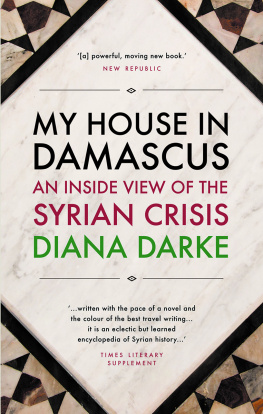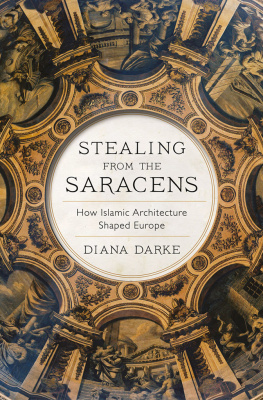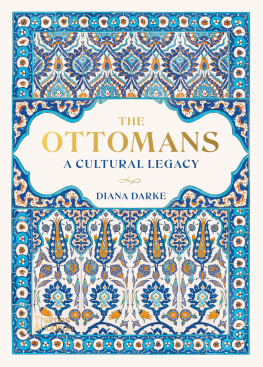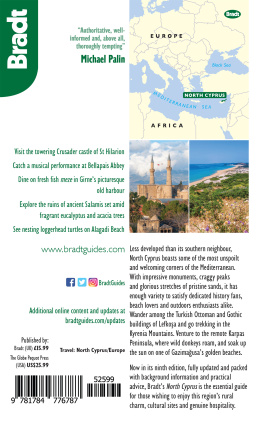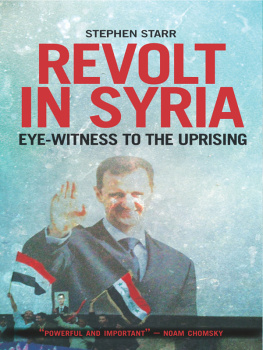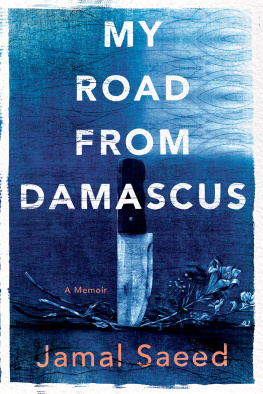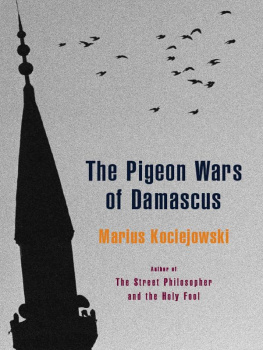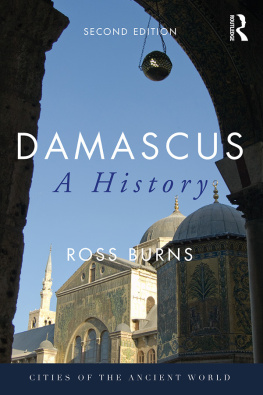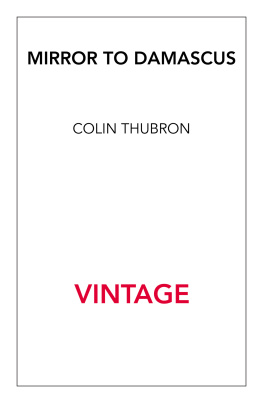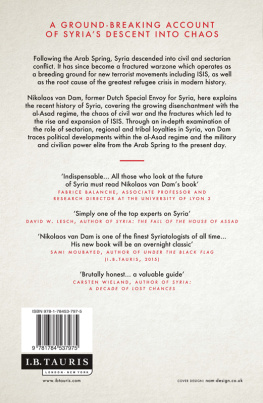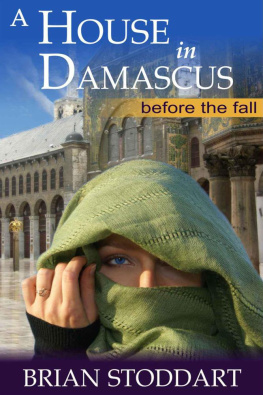Contents
Pagebreaks of the print version
MY HOUSE IN DAMASCUS
For every copy of this book sold Haus Publishing will donate 15% of receipts and Diana Darke 15% of her royalty to a Higher Education Fund for Syrians administered by the Sad Foundation.
www.saidfoundation.org
www.syriarelief.org.uk
DIANA DARKE has specialised in the Middle East for over thirty years, living and working in a range of Arab countries as an Arabic translator and consultant for both public and private sectors. She is well-known as an authority on Syria, contributing to the Guardian , the Financial Times and the BBCs From Our Own Correspondent , and is the author of Bradt guides to Eastern Turkey and Syria.
With her house in use as a refuge for displaced friends since September 2012, her links with Syria are deep and ongoing. She has been back six times since the revolution began and remains actively committed to helping Syrians achieve a better future.
www.dianadarke.com
My House in Damascus
An Inside View of the Syrian Crisis
DIANA DARKE

First published in Great Britain in 2014 by
HAUS PUBLISHING LTD
70 Cadogan Place, London SW1X 9AH
www.hauspublishing.com
This third edition published in 2016
Copyright Diana Darke, 2014
The right of Diana Darke to be identified as the author of this work has been asserted in accordance with the Copyright, Designs and Patents Act 1988
Excerpt from The Story of San Michele by Axel Munthe reprinted by kind permission of John Murray. Copyright Axel Munthe 1929 (renewed)
Cover image: Peter Horree/Alamy
ISBN 978-1-908323-99-6
eISBN 978-1-908323-65-1
Typeset in Garamond by MacGuru Ltd
Printed and bound in Spain by Liberdplex
A CIP catalogue for this book is available from the British Library
All rights reserved.
Dedication
My mother died while I was writing this book. Part of it was even written sitting at my childhood desk in her flat, gazing out over the cherry trees that shielded her from the street. She was 89 and had been ready for some time. If I die tomorrow, she used to say, I can say I had a wonderful life. Sometimes she would say it several times an hour she had the beginnings of dementia.
Hers was a good death. I was there with her at the end and she knew me. I saw the bright light behind her eyes: she knew where she was going, and I see death differently now.
But how do people cope with a bad death? Syria is tearing itself apart as I write: young people, children, whose lives have barely started, are dying. How do their families survive the trauma of their deaths, with no preparation, no warning, no chance to say all the things left unsaid? How will the parents of Hamza al-Khatib live now, after the body of their mutilated 13-year-old son was returned to them? How do they come to terms with what he endured at the end of his short life, in detention with the Syrian security forces for a month, followed by the final two days of mind-distorting torture that killed him? Bruised, battered, electrocuted, castrated and to what end?
I dedicate this book to my mother and to Hamza al-Khatib two opposites in death.
Contents
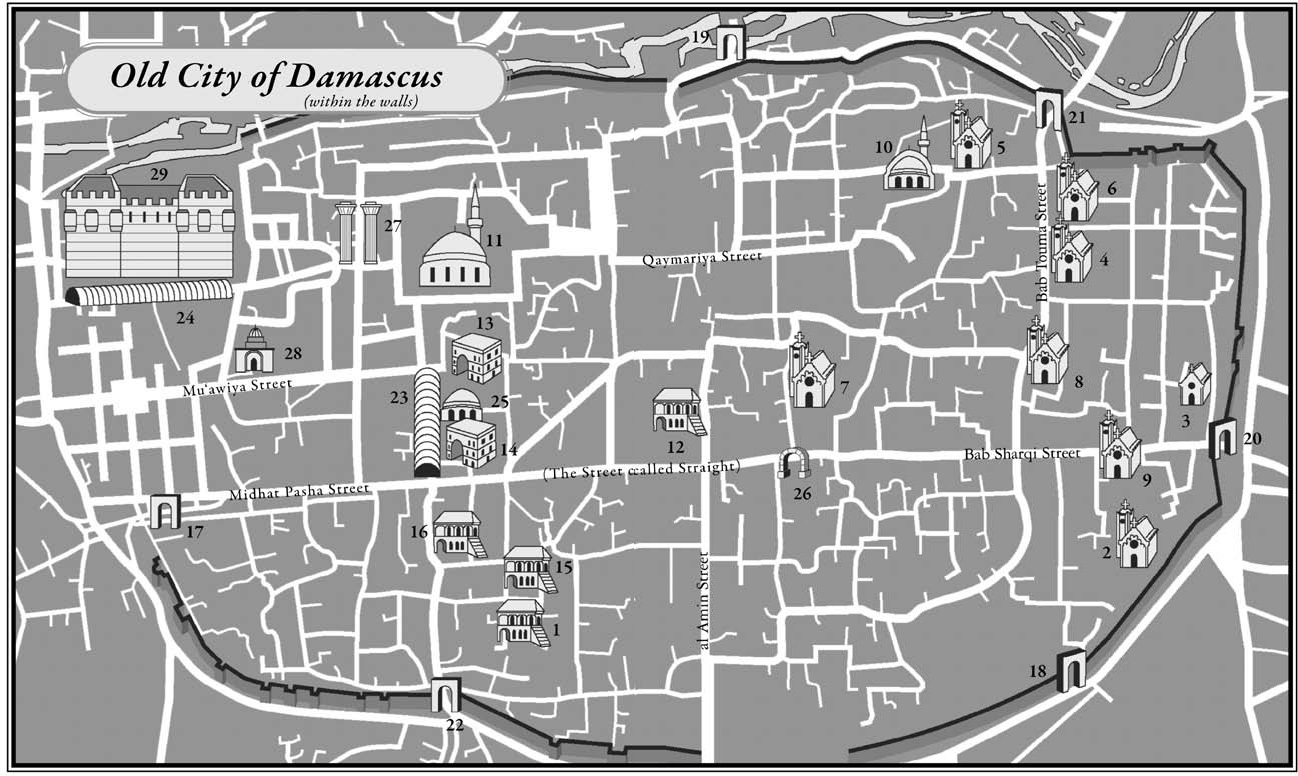
- Bait Baroudi
- Greek Melki te Cathedral
- Ananias Chapel
- Franciscan Monastery
- Jesuit Church
- Church of the Maronites
- Miryami ya Church (Greek Onhodox)
- Church ofSt George (Syrian Orthodox )
- Syrian Catholic Church
- Bakri Hanunam
- Umayyad Mosque
- Maktab Anbar
- Azem Palace
- KJtan As'ad Pasha Al-Azem
- Bait Nizam
- Bait Siba'i
- Bab al Jabiye
- Bab Kissan
- Bab as Salam
- Bab Sharqi
- Bab Touma
- Bab as Saghir
- Bzouriya souk (spice market)
- Souk al Hamidiya
- Hammam Nur Ad-Din
- Roman arch
- Temple ofJupiter
- Maristan Nur Ad-Din
- Citadel

Preface
Our waking world is no better than dreaming, compared to the life after death.
Prophet Muhammad
It will end one day. But it will not be quick, say my Syrian friends. As I write, the Syrian regime is entangled in the web of a popular revolution inspired by the example of fellow Arabs in Tunisia, Egypt, Libya, Bahrain and Yemen. The seeds of what is happening in Syria now were sown long ago, and I have watched them germinate. Seasoned experts both inside and outside the country insisted right up until mid-March 2011 that it would not happen in Syria. I did not believe them. I had observed and experienced first-hand why people were so frustrated and angry, and why this frustration had led to revolution.
Ever since my first visit to Syria in 1978 I have always felt at home there. Each Arab country drew me differently, but it was in Syria that I found, and continue to find, everything I like best about the Arab world: friendly but dignified people, an attachment to traditional family values, deep loyalties and friendships all set within a multi-coloured tapestry of biblical, classical and medieval sites in landscapes of astonishing beauty.
Years later, commissioned to write the Bradt Syria guide, the countrys spell was as strong as ever. I dont know why, I said to my travelling companion, but I feel Damascus is somewhere I could spend time in.
How on earth would you do that? she asked.
I have no idea, was my honest reply.
This story has been in my head for some years now, and many people have urged me to write it. At first I did not really understand why. What was so interesting about someone buying a house in Syria? To me, it had become normal, and my regular stays in Syria routine. But gradually I came to see that the ongoing violence made it all the more important to show a side of Syria beyond the hysteria of media reportage and behind the clinical analysis. I wanted to explore the depths of its social and spiritual cohesion and to examine how its rich diversity might help it face the future beyond the revolution. Why was it so complex and why was the country so misunderstood?
Our western prejudices run deep. After 35 years of specialisation, I thought I knew the Middle East quite well. But I was on the outside, looking in. Now, thanks to my ownership of Bait Baroudi, I have been on the inside looking out my perspective has changed.
How did it all begin? In pursuit of a dream, that much I knew, a dream to buy and restore a courtyard house. But dreams rarely lead where you expect.

Who are you?
I am Time who subdues all things and is ever running.
And why do you have wings on your feet?
Because I fly with the wind.
And why does your hair hang over your face?
So that he who meets me can take me by the forelock.
And why, in Heavens name, is the back of your head bald?
Because none whom I have once raced past on my winged feet will now, though he wishes it sore, take hold of me from behind.
Poseidippos, Greek poet, on Kairos , the opportune moment
Worlds of Conflict and Harmony
The pleasure of food and drink lasts an hour, of sleep a day, of women a month, but of a building, a lifetime.

